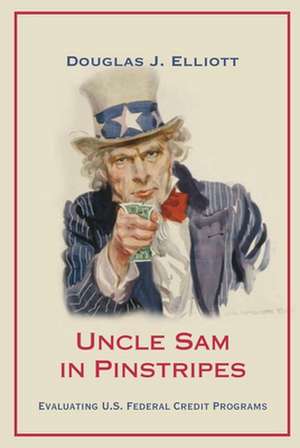Uncle Sam in Pinstripes: Evaluating U.S. Federal Credit Programs
Autor Douglas J. Elliotten Limba Engleză Paperback – 19 oct 2011
It is a long-held perception that America is a nation where the government typically stays out of day-to-day business activities. Yet the U.S. federal government is in many ways the biggest and most influential financial institution in the world, with $10 trillion in federal guarantees and loans going to the private sector. Even before recent implementation of massive interventions meant to stave off financial calamity, the federal government directly or indirectly provided significantly more credit than any of the country's largest private sector banks. And, of course, the government's credit activities have recently expanded far beyond this core of traditional programs in the face of economic crisis. What does the true picture of this sector look like, and how does it affect the overall economy?
Uncle Sam in Pinstripes is an accessible primer on U.S. federal lending, providing an instructive look at one of the most important interfaces between the U.S. government and its citizens as well as the transactions that result. Douglas Elliott's introductory chapter makes clear the critical importance of federal credit programs and hints at some of their complexities. The remainder of this book fills in the details—the how, what, why, and the ramifications—allowing readers of all stripes to understand the history, current state, and key policy issues surrounding federal credit provision. No picture of the U.S. economy is complete without a fuller understanding of this increasingly important sector.
There is considerable evidence that taxpayers are not receiving the value for money that they should. The author believes that a number of steps should be taken to increase the effectiveness and efficiency of federal credit programs. These are explained in the final chapter and include the following actions, among many others:
• Target borrowers more carefully. • Take into account more fully the relative risk of different loans. • Use the same budget rules for all federal credit programs. • Use risk-based discount rates for federal budget purposes. • Create a federal bank to administer all credit programs.
Uncle Sam in Pinstripes is an accessible primer on U.S. federal lending, providing an instructive look at one of the most important interfaces between the U.S. government and its citizens as well as the transactions that result. Douglas Elliott's introductory chapter makes clear the critical importance of federal credit programs and hints at some of their complexities. The remainder of this book fills in the details—the how, what, why, and the ramifications—allowing readers of all stripes to understand the history, current state, and key policy issues surrounding federal credit provision. No picture of the U.S. economy is complete without a fuller understanding of this increasingly important sector.
There is considerable evidence that taxpayers are not receiving the value for money that they should. The author believes that a number of steps should be taken to increase the effectiveness and efficiency of federal credit programs. These are explained in the final chapter and include the following actions, among many others:
• Target borrowers more carefully. • Take into account more fully the relative risk of different loans. • Use the same budget rules for all federal credit programs. • Use risk-based discount rates for federal budget purposes. • Create a federal bank to administer all credit programs.
Preț: 209.03 lei
Nou
Puncte Express: 314
Preț estimativ în valută:
39.100€ • 43.58$ • 33.70£
39.100€ • 43.58$ • 33.70£
Carte tipărită la comandă
Livrare economică 23 aprilie-07 mai
Preluare comenzi: 021 569.72.76
Specificații
ISBN-13: 9780815721390
ISBN-10: 0815721390
Pagini: 147
Ilustrații: Illustrations
Dimensiuni: 152 x 229 x 12 mm
Greutate: 0.23 kg
Ediția:New.
Editura: Brookings Institution Press
Colecția Brookings Institution Press
ISBN-10: 0815721390
Pagini: 147
Ilustrații: Illustrations
Dimensiuni: 152 x 229 x 12 mm
Greutate: 0.23 kg
Ediția:New.
Editura: Brookings Institution Press
Colecția Brookings Institution Press
Notă biografică
Douglas J. Elliott is a fellow in Economic Studies at the Brookings Institution, where he is part of the Initiative on Business and Public Policy. He was an investment banker for two decades, specializing in financial institutions, and also served as founder, president, and principal researcher for the Center on Federal Financial Institutions.
Descriere
It is a long-held perception that America is a nation where the government typically stays out of day-to-day business activities. Yet the U.S. federal government is in many ways the biggest and most influential financial institution in the world, with $10 trillion in federal guarantees and loans going to the private sector. Even before recent implementation of massive interventions meant to stave off financial calamity, the federal government directly or indirectly provided significantly more credit than any of the country's largest private sector banks. And, of course, the government's credit activities have recently expanded far beyond this core of traditional programs in the face of economic crisis. What does the true picture of this sector look like, and how does it affect the overall economy?
Uncle Sam in Pinstripes is an accessible primer on U.S. federal lending, providing an instructive look at one of the most important interfaces between the U.S. government and its citizens as well as the transactions that result. Douglas Elliott's introductory chapter makes clear the critical importance of federal credit programs and hints at some of their complexities. The remainder of this book fills in the details—the how, what, why, and the ramifications—allowing readers of all stripes to understand the history, current state, and key policy issues surrounding federal credit provision. No picture of the U.S. economy is complete without a fuller understanding of this increasingly important sector.
There is considerable evidence that taxpayers are not receiving the value for money that they should. The author believes that a number of steps should be taken to increase the effectiveness and efficiency of federal credit programs. These are explained in the final chapter and include the following actions, among many others:
• Target borrowers more carefully. • Take into account more fully the relative risk of different loans. • Use the same
Uncle Sam in Pinstripes is an accessible primer on U.S. federal lending, providing an instructive look at one of the most important interfaces between the U.S. government and its citizens as well as the transactions that result. Douglas Elliott's introductory chapter makes clear the critical importance of federal credit programs and hints at some of their complexities. The remainder of this book fills in the details—the how, what, why, and the ramifications—allowing readers of all stripes to understand the history, current state, and key policy issues surrounding federal credit provision. No picture of the U.S. economy is complete without a fuller understanding of this increasingly important sector.
There is considerable evidence that taxpayers are not receiving the value for money that they should. The author believes that a number of steps should be taken to increase the effectiveness and efficiency of federal credit programs. These are explained in the final chapter and include the following actions, among many others:
• Target borrowers more carefully. • Take into account more fully the relative risk of different loans. • Use the same















